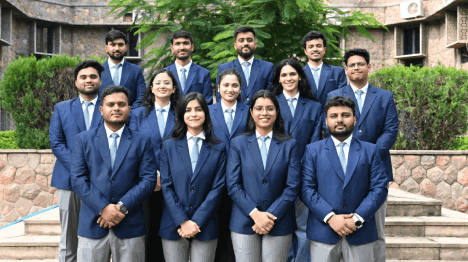- About Us
-
Academics
Schools
Programs
General Information
-
Faculty
The faculty members and researchers working at IIHMR University come from varied backgrounds including, but not limited to medicine, public health, management, economics, statistics, demography, human geography, social and behavioral sciences, rural development and pharmaceuticals.
-
Admissions
- Research
Publications & Journal
- Executive Education
Executive Programmes
- Online Certification Courses
ONLINE CERTIFICATION Courses
- Training
- Placements
- Contact
- Pradanya
- Blog
- Fee Payment
- NAAC
- IQAC
- NIRF
-
About Us
- About IIHMR University
- Board of Management
- Academic Council
- Board of Studies
- Research Board
- Institutional Review Board
- Finance & Audit Committee
- Departmental Research Committee
- Chairperson's Message
- President's Message
- IIHMR University Act
- Infrastructure
- Collaboration
- Ranking
- Board of Studies (School of Digital Health)
- Awards & Accolades
-
Academics
- Institute of Health Management Research
- School of Pharmaceutical Management
- ML Mehta School of Development Studies
- School of Digital Health
- SD Gupta School of Public Health
- MBA (Hospital and Health Management)
- MBA (Pharmaceutical Management)
- MBA (Development Management)
- MBA (Healthcare Analytics)
- Master of Public Health
- Student Manual – Cohort 9 (2021-2023)
- Master of Public Health (Offered by Johns Hopkins Bloomberg School of Public Health, USA in cooperation with IIHMR University, Jaipur, India)
- Ph. D.
- MBA CSR & ESG Management (Executive)
- MBA Sustainable Business Management (Executive)
- Common Information for all the Programs
- Academic Calendar
- Student Handbook 2020-21
- Committees
- Policies
- Annual Exam Calendar
- Library
- Faculty
- Officers of University
- Dean of Institute of Health Management Research
- Dean of School of Pharmaceutical Management
- Dean of School of Development Studies
- Dean of SD Gupta School of Public Health
- Dean of School of Digital Health
- School of Digital Health
- Faculty List A to Z
- Faculty List Designation Wise
- Faculty List School Wise
- Admissions
- Research
- Executive Education
- Training
- Placements
- Alumni
- Events
- Job Openings
- Contact
- Research
Strengthening of HMIS in Bihar
Agency : UNFPA
Project Team:Santosh Kumar, S.P. Chattopadhyay, Tukaram Khandade, Akhil Agrawal, Bimlesh Sinha,Vikash Singh, Vishal Singh, Ganesh Rajpoot, Aash Mohammad
To improve the quality of HMIS data in terms of timeliness, completeness and correctness and its utilization in planning and decision- making at every health facility level in Bihar, IIHMR Jaipur undertook a project titled “Strengthening of HMIS in Bihar” with the support of UNFPA.The Projectwas implemented from October 2009 to March 2014.
The Specific objectives of the project were:
- to train health functionaries at different levels of facilities and to oversee the quality of the data generated at different levels (HSC, PHC, District, and State);
- to build analytical capacity of the middle level managers to use the data in planning, monitoring, evaluation and decision making;
- to establish a system of feedback and suggest measures for improvement at different levels;
- in order to to make the project efforts sustainable, to transfer the skills and learning by the project and its protocols to government officials.
To change the HMIS of Bihar was not a short-term task. Adequate infrastructure and trained staff in the area were vital aspects of strengthening the HMIS. User participation from the inception of ideas of such systems, their initiation, design, development and implementation were also required in order to develop gradual changes in the user’s understanding and to enable IT to become a normal way of doing things. Such changes needed to be carried out incrementally, enabling users to learn from previous changes and to incorporate new changes that emerge over time. Thus, the actors needed to create an environment that enabled in-house and external generation and sharing of knowledge within the sustainability strategy framework. Efforts to bring the above-mentioned change at all management levels are now beginning to take root. As a result, support to the system by higher management now will play a significant supportive role and will be a crucial pivot in the roll-out of the system and continued and effective utilization of generated data/information.
Finally, HMISwas not only about technology, butwas also important to support it with social and political commitment to making it a game changer – a sustainable, reliable and effective tool in health system information management in the state in the years to come.



